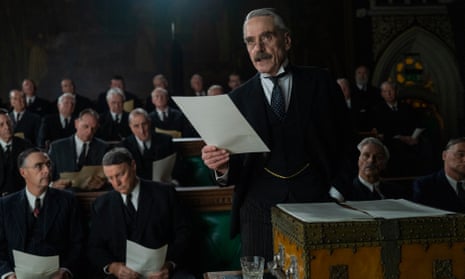There’s a great turn from Jeremy Irons as the careworn appeaser Neville Chamberlain in this breezy what-if political thriller, adapted from the page-turner by Robert Harris and directed by Christian Schwochow. It’s set at the notorious 1938 Munich conference, convened by Adolf Hitler to force the cringing western powers into giving him the Czech Sudetenland.
With some generous revisionism, this film makes the case for Chamberlain’s savvy negotiating powers and heroic self-sacrifice: he was apparently buying time for British rearmament and exposing Hitler as a bully at the cost of his own reputation. The movie even includes some eyebrow-raising dialogue on the plane home, after Chamberlain has got Hitler to sign that piece of paper promising peace, in which the prime minister predicts that if the Führer ever broke his promise, he would call down world fury on himself – and even bring the Americans into the resulting war! Could Chamberlain have come within a mile of foreseeing that? Or is the movie’s tongue in its cheek?
George MacKay and Jannis Niewöhner play Hugh Legat and Paul von Hartman, two (fictional) minor functionaries on the British and German sides who happened to be best friends at Oxford in the early 30s. With their German friend Lenya (Liv Lisa Fries), they had a kind of come-to-the-Cabaret intimacy, of a more wholesomely non-sexual sort, before Hugh fell out with Paul over the young German’s Hitler fan-worship and Lenya mysteriously vanished. But fast forward to 1938 and Paul is now secretly anti-Nazi, planning to sneak his old pal Hugh a secret document that will prove Hitler’s plans for conquest and disrupt the deal. If he is caught, he will be sent to the camps – and the British themselves, increasingly committed to appeasement and their own supposed heroism in averting war, would be furious at this desperately dangerous game.
Robert Bathurst plays genial British ambassador Sir Nevile Henderson and Alex Jennings is the peppery, stiff-necked diplomat Horace Wilson. In this very male world, perhaps it is telling that the female characters are the fictional ones: Jessica Brown Findlay is Hugh’s unhappy wife Pamela and Sandra Hüller is Helen Winter, the worldly army widow with whom Paul is having a gloomy affair. The Führer is Ulrich Matthes, who played Goebbels in Downfall.
Just as Hugh is beguiled by Chamberlain’s twinkly-eyed charm in private over whisky and cigars, so Paul finds himself mesmerised by Hitler’s cobra gaze and the sickly, hideous thrill of Führerkontakt as Hitler, due to some caprice of his own, decides that he will elicit the opinion of this stammering aide.
It all rattles along easily enough, with some nice spycraft set pieces. As with Frederick Forsyth’s The Day of the Jackal, the fact that you know what happens in the end is no bar to enjoyment. But the junior members of the cast, who are the stars, look pretty lightweight compared to Irons’s Chamberlain and I wonder if it wouldn’t have been better to adapt Harris’s book as a two- or three-part streaming TV version in which characterisation could have been built up and smoothed out, and Lenya’s fate would have been resolved less perfunctorily. Well, none of this stops it being an ingenious, elegant counterfactual drama.
